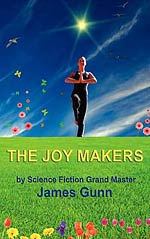
![]() BigEnk
BigEnk
11/21/2024
![]()
This was a struggle for me to read and finish. Perhaps I was in a reading slump, but I suspect that my slump was at least in part caused by the book itself. The Joy Makers is a dystopian fix-up novel that centers around the main theme of hedonism. A company of unknown origin begins promising unlimited happiness of body and soul, for the small price of everything you own now and in the future, should you follow their dogmatic philosophy. They grow in power and prosperity, until they control the earth and its populace, all ruled by a board of governors that sit above their own laws. Eventually, a colonist from Venus travels back to Earth and discovers just how far the automation of humanities creation has taken the pure ideals of hedonism. Needless to say, the humans that inhabit this dystopia are not all happy. Who can be happy in a system that vilifies sadness?
It's a thematically dense book, uncompromising in it's exploration. What is happiness without suffering? Is present happiness worth sacrificing future happiness? Can happiness exist without free will? What are the innate desires of humanity, can we achieve them, and if we can, are they actually good for us? Indeed, what is more valuable on a personal or societal level than self gratification? It is in unraveling these questions that I think Gunn shows his strengths. Especially in last of the three novellas, Gunn does an excellent job not only creating a gripping end to the story, but also explores his philosophical ideas with a higher level of clarity and cohesion. Gunn makes a bold choice to lead every chapter with a real world philosophical musing on happiness. Some of these are fitting and prescient. Others not so much.
There are some moments of social prescience and creative imagining that stuck with me. I have to imagine that The Matrix was at least partially inspired by the embryonic cells that humans are confined too, where they float in a warm fluid, being fed by an omnipotent AI, given dreams to sedate and pacify them. Gunn also singles out Monsanto and DuPont as leaders in an increasingly corporate system, which couldn't be closer to the truth.
Unfortunately Gunn is not nearly as adept at writing the other layers of a truly great story. His prose is boring and monochromatic. Sentences bleed together with the same cadence, one after the other. Most characters are dull and two dimensional. Pacing is uneven. Action sequences are stilted. Setting is inadequately described, leaving most locations fuzzy in my mind. As with most fix-up novels, these different sections are wildly different in their quality, leading to jarring read. At least, as I stated before, the final novella is Gunn's best, which cleansed my palate from the first two.
The Joy Makers is a deeply uneven novel that focuses more on theme than cohesion or entertainment. I'm not of the opinion that every novel must entertain, but it becomes hard to understand and appreciate the richness of Gunn's thematic draw if there's hardly anything else to engage with. Brave New World springs to mind as an example of book that touches some of the same ideas and also manages to accomplish so much more. Nevertheless, I think that I'd be interested in reading this novel again in the future to see if it reads better.